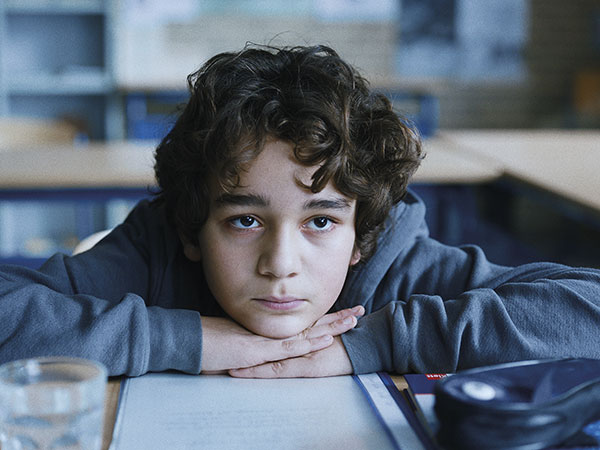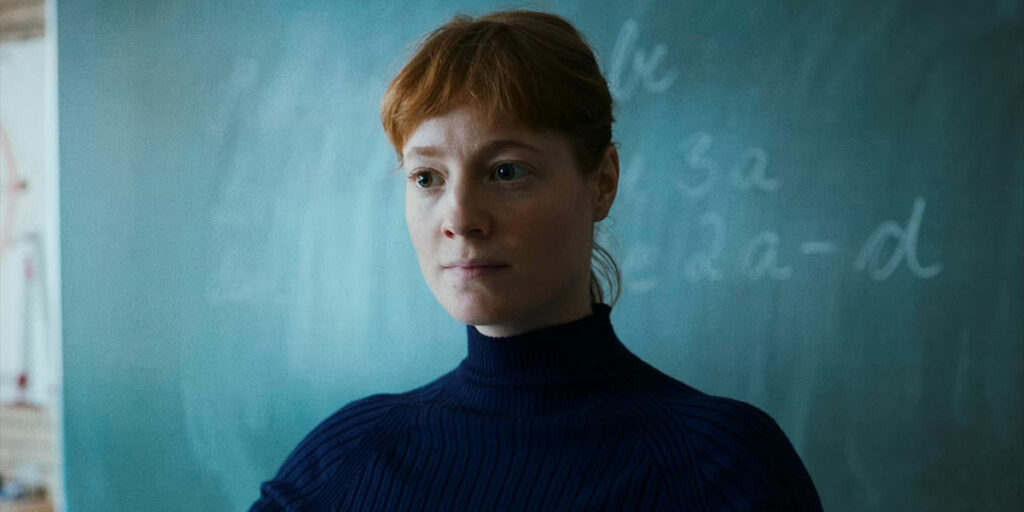İlker Çatak’s The Teachers’ Lounge effectively traps us in its tense classroom setting, but its slow pace may put off viewers.
For some reason, no matter the point in our life, we as humans always seem to dream about being back at school. My school-related dreams are unfortunately never fun, constantly morphing into nightmares. Whether I’m being chased by a mythical creature, or I simply just accidentally brought my childhood teddy bear into school, the classroom is always portrayed by my brain as this place I can never leave, and should always be fearful of. This idea of the classroom trapping us is the central thesis of director İlker Çatak’s newest feature film, The Teachers’ Lounge (Das Lehrerzimmer). A classroom is a place we’re conditioned to see as a second home from what feels like the minute we’re born, but despite this, Çatak turns it into a prison.
The Teachers’ Lounge follows Carla Nowak (Leonie Benesch), a seventh-grade teacher who finds herself caught in the midst of a school-wide scandal. A series of thefts have occurred on the premises, and as Carla tries to pinpoint the culprit, the consequences of her accusations create tension and strain in the classroom. By far, the most remarkable aspect of the film is how isolating it is. We never see Carla’s life outside of the school. There’s no love interest, no family, and no financial struggles to distract us, Çatak instead chooses to hyper-focus on his setting. He creates a sense of rising tension between Carla and her students and never once lets us have a second away from it. It’s incredibly effective and helps towards the film’s goal of keeping the viewer on edge for 94 minutes straight.
The quality of a film this low-key almost entirely hinges on its performances, and luckily Benesch is superb in the lead role. As the film’s script escalates and the drama heightens, she stays grounded with a brilliantly naturalistic performance. The child acting on display here is equally fantastic, with Leo Stettnisch delivering a great performance as Lukas, the film’s central child character. Serving for a lot of the runtime as the film’s emotional core, Lukas is forced to deal with a lot of emotional turmoil and tough realisations, and Stettnisch navigates this all perfectly.

For me, an easy high point of the film is the classroom scenes. It’s in this environment where the movie’s central idea of transforming this supposed safe space into something more akin to a prison comes into focus. As the plot progresses and the tension rises, the space in the room seemingly becomes smaller thanks to some brilliant cinematography. In the beginning, the jovial teaching scenes feel warm and friendly. By the end, they feel cold and hostile. The lighting dims and we spend more time in silence, even something seemingly simple like the curtains being shut results in a far more unpleasant feeling.
With all that being said, the film does fall prey to some shortcomings. For one, Marvin Miller’s score unfortunately doesn’t work at all. It’s obvious what they were trying to do here, the score feels straight out of a horror or thriller movie, with the intention being that it wants to constantly build suspense and tension every time it’s used. However, for a film this otherwise quiet and low-key, it feels like the more suitable choice would have been to mostly go without a score at all. As it is, the film can often feel like it’s trying to build tension out of thin air, rather than trying to amplify already tense moments. As effective as the drama can be, suspenseful is not a word I’d choose to associate with it, so the choice to pair it with that kind of music can often make the two elements feel at odds with each other.
Also, the plot moves at a slow pace, never once feeling the need to rush the development of its conflicts. This choice of pacing generally works in its favour. The conflict here doesn’t immediately surge, instead, it slowly builds, as the characters become more and more frustrated with their circumstances and each other. With that being said, it can often veer into sluggish territory. The obvious risk of combining a slow pace with low emotional stakes is that you can easily lose your viewer, and I’d be lying if I said there weren’t times when I wished there was more going on. At times, it can feel like an overly long short film, missing some of that needed substance to justify a feature-length runtime.
Çatak definitely makes bold choices throughout the film, but it can sometimes come across as lacking in plot, and so not having a whole lot to keep audiences engaged. The third act ramps up the drama and has multiple hard-hitting moments, but the film struggles to balance its generally low-key nature with these bigger moments, and it results in a climax that feels at times messy and inconsistent.
Despite this, the sense of atmosphere The Teachers’ Lounge creates makes it absolutely worth a watch. Its slow pace and small stakes may be off-putting to some viewers, but if you’re willing to stay with it, you’ll be rewarded with a confidently directed, well-acted drama, complete with a brilliant final shot. In that last moment, Çatak releases you from his grip, and you’ll finally remember what air feels like.
The Teachers’ Lounge premiered at the 2023 Berlin Film Festival and will be released in UK cinemas by Curzon on March 22, 2024.

